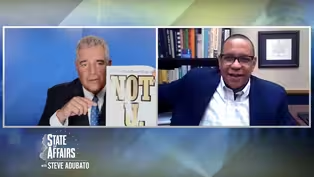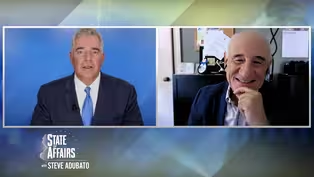State of Affairs with Steve Adubato
Why We Need More POC and Women in Public Office
Clip: Season 7 Episode 22 | 8m 42sVideo has Closed Captions
Why We Need More POC and Women in Public Office
Shennell McCloud, CEO of Project Ready, sits down with Steve Adubato to address the lack of representation of women and people of color in public office and the impact this has on our democracy.
Problems playing video? | Closed Captioning Feedback
Problems playing video? | Closed Captioning Feedback
State of Affairs with Steve Adubato is a local public television program presented by NJ PBS
State of Affairs with Steve Adubato
Why We Need More POC and Women in Public Office
Clip: Season 7 Episode 22 | 8m 42sVideo has Closed Captions
Shennell McCloud, CEO of Project Ready, sits down with Steve Adubato to address the lack of representation of women and people of color in public office and the impact this has on our democracy.
Problems playing video? | Closed Captioning Feedback
How to Watch State of Affairs with Steve Adubato
State of Affairs with Steve Adubato is available to stream on pbs.org and the free PBS App, available on iPhone, Apple TV, Android TV, Android smartphones, Amazon Fire TV, Amazon Fire Tablet, Roku, Samsung Smart TV, and Vizio.
Providing Support for PBS.org
Learn Moreabout PBS online sponsorship[INSPRATIONAL MUSIC STING] - Back by popular demand, we have Shennell McCloud, who is the CEO of Project Ready.
Good to see you, Shennell.
- It's so good to be here.
I'm very excited, because today is a very important day.
It's National Voter Registration Day.
So if you're out there and you're listening, please make sure to register to vote as we prepare for a very important election that's coming in November and beyond.
- By the way, we are taping at the end of September.
This will be seen later, but it's just as relevant.
So, Shennell, let's get right into this.
Again, there's a graphic that'll come up, Decision 2024: Democracy in Danger.
We're talking about democracy potentially being in danger for a whole range of reasons, but one of them is the inadequate, disproportionate, terrible representation numbers as it relates to women in public office.
The American Center for Women in Politics at Rutgers University put out a report that said, while 51% of the population in New Jersey happens to be women, 27% of those in elective positions are women.
What the heck does those numbers have to do with democracy in danger?
Or am I engaging in hyperbole?
- No, democracy is absolutely in danger.
And I wanna give some framing here.
What I think we see in New Jersey right now are a few things: a tipping point, a problem, and then, potentially, an opportunity.
First off is the tipping point.
As you all know, we unfortunately, and I've been devastated by this loss, Lieutenant Sheila Oliver, our lieutenant governor.
And what was very sad to me was, one, obviously the loss of such an incredible power player in the state of New Jersey who represented the issues of all, and especially the issues of Black women, but what I also realized is that we had no pipeline actually prepared in order to ensure that we could have someone who represents Black women in that seat.
I am very excited that Lieutenant Governor Tahesha Way has taken the seat, but it does leave the question, Steve, which is what is the pipeline?
And so now that leads us to the problem: New Jersey overall is still representing an old boys club.
White men hold all of the top positions of power at the state level, our governor, our senate president, our assembly speaker.
And I think Black women are at a place where we are tired of just organizing around the voting bloc and making sure that we're getting people elected into the office.
We're at a phase right now where we want to start claiming our seats at the table.
And so I think that leads us to the opportunity that exists, which is we're just a little bit less than eight weeks away from the November election.
There are over 120 seats that are open.
And what's exciting about this opportunity is there are about 30 or so seats that are open with no incumbent, which could make way for us to actually see a more diverse democracy, perhaps even us inching closer to a more fair democracy where we can start to see bedrock issues, like same-day voter registration, like, increases in equitable education.
- How about childcare?
- Yeah, I was just gonna say like childcare, and perhaps even a closure in the wealth gap that we all know deeply impacts Black women.
We can perhaps start to see some of those things shift across New Jersey, but we have to vote and we have to be working on a pipeline of Black women and/or people of color who are prepared to take these seats.
- You know, there's a male-female issue, but there's also gender issues, obviously, but there's race as well.
Just wanna clarify that we just recently had the chair of the Essex County and the State Democratic Party, LeRoy Jones, on who happens to be a former legislator and an African-American man.
But unless I'm wrong, and I know you'll correct me if I am, I don't believe there are any party chairs, I'm pretty sure in the Democratic party there are no women as party chairs, and I don't think there are in the Republican party, 21 county chairs.
I don't wanna get into the weeds, but the county chairs have a lot to say with who runs, who doesn't run, where you are on the ballot, all kinds of those things, who gets the party line.
I know it's in the weeds and the mechanics of- - No, it's important.
It's important.
- Right.
Go ahead, Shennell.
- We have to pull up.
it's important, and I think you bring up a very valid issue, which is that the party line, I believe and I believe most of us believe, actually holds us back from being able to diversify our democracy across the state of New Jersey in the spirit of being able to see New Jerseyans, and as I stand here today I'm representing Black women, to be able to see Black women actually get their issues addressed.
We have to start blowing up the party line, blowing up this concept that that is the only way that you can get your seat at the table.
Which is why- - How?
How do you blow up a system that's been in place over 100 years and say, "This isn't working," because it's clearly not as it relates to being more representative of the population, both in terms of race and gender.
How do you blow it up?
- It's a good point, and one that Project Ready, the social justice organization that I'm representing, has been trying to tackle.
We're starting off with just making sure that people are actually voting, Steve.
Across the state of New Jersey, there are over six million registered voters who are eligible to vote and who can actually make a difference.
And what we're finding is that more of our voters, specifically our youth, are not excited about voting.
We believe one of those reasons is that they don't see enough representation of themselves and people who ultimately represent them in the seats.
And so I believe the second solution, which is also something we're working on at Project Ready in partnership with our national partner, Ignite, is to actually begin to prepare Black women to take these seats, to prepare them to know that there is an opportunity, that you don't have to subscribe to the party line just to run for something.
And if we get enough voters to activate around this, then we can actually start to see a real difference, - You know, promise that you'll keep this conversation going with us because there are so many aspects to this, including the 2024 election for President.
Someone might say, "Well, why would you even talk about that?"
Because if the candidates are President Biden and former President Trump, that has implications on a lot of levels, and even as it relates to the issue we're describing right now, a more representative, if you will, democracy.
Shennell McCloud- - Yes, and, Steve, I love that.
I just wanna emphasize- - Real quick, go ahead.
- we should not just be talking about the presidential, we should also be thinking about the 2025 gubernatorial.
These are elections that seem far away, but they're actually right up close and personal.
And what we do today will dictate the future that we have tomorrow, a more equitable future.
- Shennell McCloud, CEO of Project Ready.
Thank you, my friend.
We'll talk soon again.
- Thank you, Steve.
Thanks, Steve.
(laughs) - Stay there, folks.
I love the energy.
We'll be right back after this.
- [Narrator] State of Affairs with Steve Adubato Is a production of the Caucus Educational Corporation.
Funding has been provided by Robert Wood Johnson Foundation.
New Jersey Sharing Network.
Citizens Philanthropic Foundation.
Community FoodBank of New Jersey.
PSC.
The Port Authority of New York and New Jersey.
The New Jersey Education Association.
Englewood Health.
And by The Adler Aphasia Center.
Promotional support provided by NJ.Com.
And by NJBIZ.
Every person and organization has a story to be told.
Not just famous people, but business leaders, public servants, doctors and nurses, educators and coaches.
At PSC, your story is our business.
For more information, visit Princeton SC.com.
The Cost and Future of Higher Education
Video has Closed Captions
Clip: S7 Ep22 | 9m 18s | The Cost and Future of Higher Education (9m 18s)
Shoplifting as Organized Crime and Consequences Needed
Video has Closed Captions
Clip: S7 Ep22 | 9m 46s | Shoplifting as Organized Crime and Consequences Needed (9m 46s)
Providing Support for PBS.org
Learn Moreabout PBS online sponsorship
- News and Public Affairs

Top journalists deliver compelling original analysis of the hour's headlines.

- News and Public Affairs

FRONTLINE is investigative journalism that questions, explains and changes our world.












Support for PBS provided by:
State of Affairs with Steve Adubato is a local public television program presented by NJ PBS

